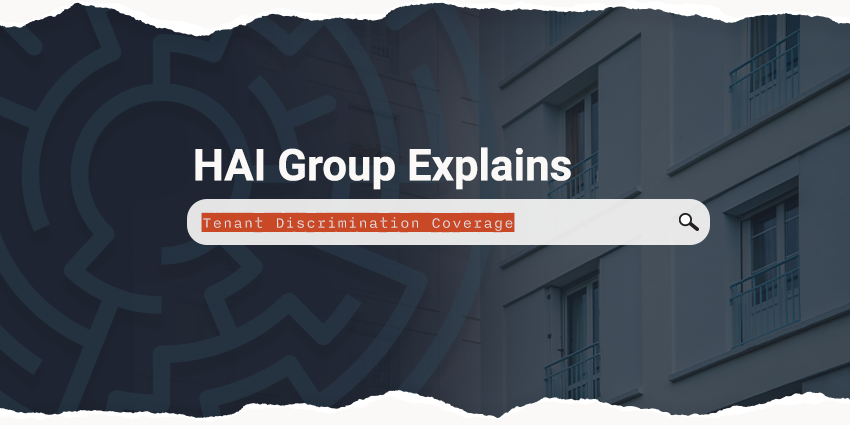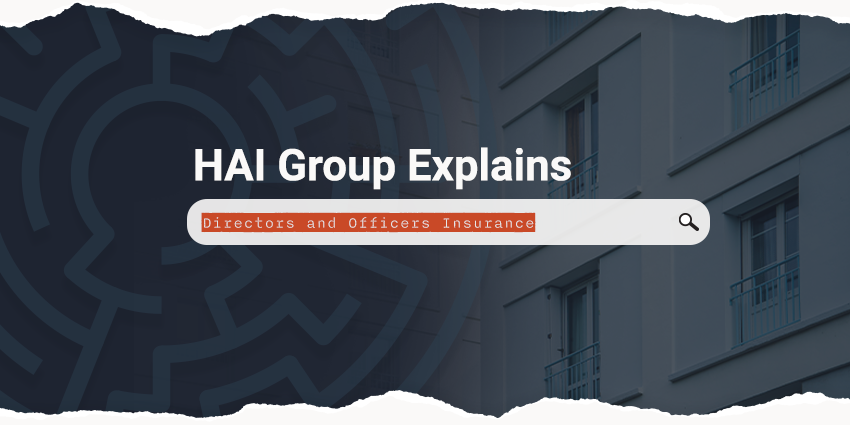Ensuring fair and equal treatment of tenants is of utmost importance in the housing industry. Unfortunately, instances of tenant discrimination—whether intentional or unintentional—still occur, posing significant financial and reputational risks to housing organizations.
To mitigate these risks and safeguard against potential legal liabilities, public and affordable housing organizations should consider acquiring tenant discrimination liability insurance coverage, said Angel Fear, a regional manager with HAI Group’s Account Services team.
“Tenant discrimination liability is a key coverage that protects against claims brought by prospective, current, or former tenants as well as tenant guests,” Fear explained.
This blog post explores the significance of tenant discrimination liability coverage and why it should be a priority for housing organizations.
Understanding tenant discrimination liability insurance
Tenant discrimination liability insurance provides a specialized form of liability coverage that protects housing providers against claims related to discriminatory practices against tenants.
“[Tenant discrimination liability insurance] provides financial assistance in the event of allegations, lawsuits, or legal action resulting from acts of discrimination, including but not limited to race, color, religion, national origin, sex, disability, and familial status,” Fear said.
Tenant discrimination coverage isn’t always standard in general liability policies, so it’s important to check in with your insurance professional, she noted.
For example, tenant discrimination liability coverage is included in HAI Group’s Housing Authority Risk Retention Group (HARRG) general liability program, which serves public housing agencies (PHAs). But the coverage isn’t included in HAI Group’s general liability program for PHA affiliate entities—often created for RAD redevelopment purposes—and would need to be added as an additional standalone coverage.
Why is tenant discrimination liability insurance so important?
1. Legal compliance and risk management:
Public and affordable housing organizations operate within a complex web of federal, state, and local laws and regulations aimed at preventing discrimination.
At the federal level, the Fair Housing Act protects people from discrimination when renting or buying a home, getting a mortgage, seeking housing assistance, or engaging in other housing-related activities. Additional non-discrimination protections apply to owners and operators of federally-assisted housing.
“Any violation of the Fair Housing Act can lead to serious legal repercussions, including escalating fines and compensation for out-of-pocket and emotional distress damage,” Fear said.
Tenant discrimination claims are often associated with allegations of discriminatory practices during the housing application or eviction process. In fact, there are numerous scenarios in which tenant discrimination claims can arise.
For example, the U.S. Department of Housing and Urban Development (HUD) ruled in 2022 that a housing organization in Oklahoma discriminated against tenants by failing to respond to racial harassment against a tenant and her boyfriend by other tenants living in the same building.
In 2022, a Texas housing organization was fined and forced to pay damages after failing to make reasonable accommodations for a tenant disabled in a car accident who asked to move from a second-story unit to a first-story unit to avoid crawling up a set of stairs.
In the event of a discrimination claim, tenant discrimination liability coverage can help protect a housing organization's financial stability and provide resources for legal defense, Fear said.
2. Financial protection:
Defending against discrimination claims can be a costly affair. Legal expenses, settlements, and damage awards can substantially impact an organization's budget. Tenant discrimination insurance provides a financial safety net, covering legal costs, settlements, and judgments.
“This protection can prevent a significant financial setback and ensure the organization's continuity,” Fear said.
She recommends coverage limits of at least $1 million for tenant discrimination liability coverage.
3. Preservation of reputation:
Public and affordable housing organizations strive to create an inclusive and welcoming environment for tenants. However, even with the best intentions, instances of discrimination can occur, leading to reputational damage.
“The negative publicity associated with discrimination allegations can undermine an organization's credibility, trust, and community relationships,” Fear explained.
She said that tenant discrimination liability policies can offer crisis management support, including public relations assistance, to help mitigate reputational harm and preserve public trust.
4. Enhanced tenant relationships:
Obtaining tenant discrimination insurance demonstrates a housing organization's commitment to fair treatment and equity for all residents.
“By actively protecting tenants from discriminatory practices, organizations can build stronger relationships based on trust, respect, and a sense of security,” Fear said. “This can lead to improved tenant satisfaction, increased occupancy rates, and positive word-of-mouth referrals.”
5. Strengthened eligibility for funding:
Public and affordable housing organizations often rely on government grants and funding to support their operations.
“Having tenant discrimination insurance coverage showcases a commitment to compliance and responsible management, which can enhance an organization's eligibility for grants and financial support,” Fear said. “Insurance coverage acts as a proactive measure, demonstrating the organization's dedication to providing a safe and inclusive environment for tenants.”
Many of the most popular financial assistance programs offered by HUD require compliance with the Fair Housing Act, including the public housing and Housing Choice Voucher programs (a full list can be found here).
Bottom line
Tenant discrimination insurance is a vital component of risk management for public and affordable housing organizations. By proactively addressing the risks associated with discrimination claims, these organizations can protect their finances, preserve their reputation, strengthen tenant relationships, and enhance their eligibility for funding opportunities.
"By investing in tenant discrimination insurance coverage, public and affordable housing organizations demonstrate their commitment to fairness, equity, and compliance with the law, ultimately contributing to the betterment of their communities," Fear said.
Are you interested in learning more about tenant discrimination liability insurance and how it can help protect your housing organization? Contact a member of our Risk Control team today:
Interested in Working With HAI Group? Our Account Services team is ready to assist you.
This article is for general information only. HAI Group® makes no representation or warranty about the accuracy or applicability of this information for any particular use or circumstance. Your use of this information is at your own discretion and risk. HAI Group® and any author or contributor identified herein assume no responsibility for your use of this information. You should consult with your attorney or subject matter advisor before adopting any risk management strategy or policy.
HAI Group® is a marketing name used to refer to insurers, a producer, and related service providers affiliated through a common mission, management, and governance. Property-casualty insurance and related services are written or provided by Housing Authority Property Insurance, A Mutual Company; Housing Enterprise Insurance Company, Inc.; Housing Specialty Insurance Company, Inc.; Housing Investment Group, Inc.; and Housing Insurance Services (DBA Housing Insurance Agency Services in NY and MI).







